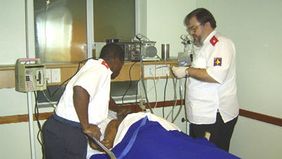We could not believe our own ears when Johan Viljoen, the project manager of the AIDS Secretariat of the South African Catholic Bishops' Conference, called us in September 2003 to say that the Catholic Church in South Africa, with the support of international donors, was going to pioneer large-scale treatment with antiretroviral drugs (called ARVs) and that we had been selected as one of the first five agencies in the whole of South Africa to start the programme immediately.
This contradicts the German saying "God's mills grind slowly but surely". This time, God's mills will be the first to grind the HIV virus in South Africa for those who cannot afford ARVs themselves. When, after this news, our government declared its readiness to issue ARVs on its part, the Bishops' Conference initially thought that our programme was no longer necessary, but several different high-level informed sources assured us that our pioneering project would certainly far precede any practical realisation of ARV treatment plans by the public health sector.
We thank God on our knees that our efforts to help the needy and sick have been recognised in such a magnificent way. When Johan Viljoen referred to us last year in a private conversation with our active member Lillian Molloy as the "flagship AIDS ministry of the Catholic Church in South Africa", we thought it was just a nice compliment, but now we are overwhelmed by this recognition and continued financial support from the Bishops' Conference and we will do our best to live up to the trust they have placed in us.
Although the medication, AIDS testing and additional staff hired directly for the ARV programme are funded through the Bishops' Conference, we anticipate a massive influx also of those patients in our hospice who fall outside the criteria for treatment with ARVs but still require palliative care.
We therefore kindly ask you to continue to support us with your donations so that we can cope with the expected large additional demand for care and its costs.
